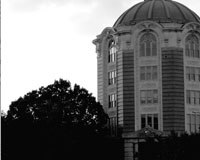
Day of the Dead
The Incredible Bouyant Jesus, as Imagined by Myself as a Girl
Her Mother's Tree Awaits Her
I am a conduit for all who came before,
the blessed and the bestial,
the kind and the dastardly.
Call it mitochondrial DNA
or a red thread running through
connecting me in a familial tapestry,
a tree of blood sap and bone limbs.
1860s emulation here –
no corset, but an extra tight bodice
pushes up my boobs.
I’m a massive ship
navigating through the crowd.
I come to understand
why ships are women.
But they were also storms,
male monikers for hurricanes
being relatively recent.
We rebel against our stays or perhaps
the spirit of the whale inhabits us
through its bones and we
long for the sea.
Or perhaps we are meant to resemble
massive cakes for consumption,
tiers of epic engineering,
ruffle and flounce over a skeleton
of reed and bone,
a walking talking costly confection.
My stomach, so squeezed,
is a churning sea.
As I run for the bathroom
my skirt hem hooks a stray nail
almost sinking me
as a group of men starts to encircle
in snake-brain memory
of assisting fainting women.
In the stall
I bend over to puke
and my hoop rises up to my face;
Bend it down, the back flies up.
Anyone coming in
will see the open stall,
my underwear, that modernism,
white granny style facing them
and hear my stomach’s contents
ejecting as scummy water
from a bilge.
Questionable tacos or stomach flu?
I’m a ship in trouble on high seas.
Evidently my ancestors
devised ingenious ways
to eat and breathe.
The Incredible Bouyant Jesus, as Imagined by Myself as a Girl
(“Shortly before dawn Jesus went out to them, walking on the lake.26 When the disciples saw him walking on the lake, they were terrified. “It’s a ghost,” they said, and cried out in fear.” (Mathew, 14:25-26, NIV)
Jesus walked on water
with the dexterity of a Christ lizard.
One of his lesser known superpowers
was incredible buoyancy.
He rode high in the womb,
squishing Mary’s lungs,
trying to float free of amnion,
to return to heaven.
When Mary, a new mother,
tried to bathe her baby,
he’d float to the top of the tub.
Any water beads would fly from his skin.
He became known as that Carpenter’s
stinky son.
When it rained, droplets stopped
an inch from his hair, and clothes.
In the hot Bethlehem summer,
he had no relief.
He couldn’t even drink water,
hence the whole changing water to wine.
Even his own tears in the garden
flew from him dispossessed.
They’re still out there floating around,
little bits of Jesus’ sorrow.
I found one in the desert yesterday
in my own wanderings
and it held all of creation
in its trembling.
Each bump of vertebra,
a bruised sore, as she
curls in cooling ashes
as a hairless possum,
her only solace
in the crust of pans.
Should she choose
to give birth to herself
from the mouth
of the fireplace,
from spent carbon,
to crawl forth
across the floor
she scrubbed to raw
splinters
and over the threshold
a bride in reverse,
at the roots
she’ll ask not for gowns,
not for a carriage,
and not for impossible shoes.
She’ll request wings,
for already she knows the value of flight.
Lucy Simpson is wife of one and mother to two children in the foothills of the Rocky Mountains. Her work has appeared in Gargoyle, WordWrights, and Natural Bridge, among other publications. Matchstick & Bramble, her first chapbook, is available from The Broadkill Press. She hates Brussels sprouts and sometimes has nightmares about them.

